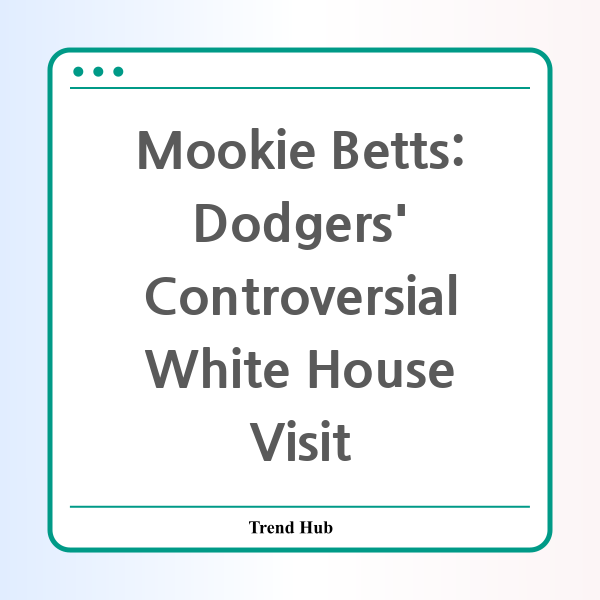* This website participates in the Amazon Affiliate Program and earns from qualifying purchases.

The Los Angeles Dodgers are once again in the spotlight, and this time the controversy surrounds their upcoming visit to the White House, following their 2024 World Series victory. With an invitation extended by President Donald Trump, the team’s decision has sparked heated debate among fans, analysts, and the broader community. This raises a critical question: What does it mean for players like Mookie Betts, who has a rich history tied to social justice and equity in sports?
For those unfamiliar with the tradition, visiting the White House is a long-standing practice for Major League Baseball champions. However, this invitation carries a particular weight due to the political climate and the ongoing discussions about race and social justice in America. With a storied past of breaking barriers, the Dodgers' visit seems like a double-edged sword.
Mookie Betts, a pivotal player for the Dodgers, has yet to publicly confirm his attendance at this event. He is known for his principled stance, having previously declined an invitation to the White House during his time with the Boston Red Sox due to political concerns. Betts's decision to join the Dodgers on this visit could send a powerful message, one way or the other, regarding his values and the stance of the team.
Critics of the visit argue that it undermines the Dodgers' legacy of social progress, particularly as they prepare to celebrate Jackie Robinson Day just eight days after the White House visit. Robinson was the first African American to play in Major League Baseball and a symbol of racial integration in sports. Observers are concerned that the visit may appear contradictory—celebrating a hero of equality while engaging with a current administration accused of divisive rhetoric.
Dodgers’ management, including team president Stan Kasten and manager Dave Roberts, have defended the visit as a celebration of their championship rather than a political statement. Roberts noted that accepting the invitation is a significant honor and a traditional practice for World Series champions. Yet, even within the organization, there remains a palpable tension surrounding the implications of their choice.
The dichotomy between tradition and principle reflects a broader cultural debate. Many fans and commentators assert that sports organizations, especially those with a history rooted in fighting for equality, must be mindful of the political implications of their actions. Social media platforms are buzzing with reactions, and the Dodgers find themselves in a complex web of expectations from a diverse fanbase.
As Mookie Betts contemplates his decision, the implications extend beyond personal choice. It affects the collective identity of the Dodgers and their connection with the community. This visit may set a precedent on how athletes engage with political matters and the expectations placed upon them.
Ultimately, the Dodgers' visit to the White House represents a tension between honoring history and confronting the present. With Mookie Betts's decision pending, fans are left to ponder: will he prioritize tradition, or uphold the values he stands for? As the team prepares for the visit to Washington D.C., all eyes will certainly be on Betts and what his choice reveals about the modern athlete's role in society.
The timing of this visit couldn't be more poignant, and it will be intriguing to see how this narrative unfolds, no matter which way Betts decides. The implications of this visit stretch far beyond a simple celebration on the White House lawn; they touch on the very essence of what it means to be a leader in today’s dynamic world.
* This website participates in the Amazon Affiliate Program and earns from qualifying purchases.